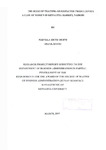| dc.description.abstract | Most countries in Africa are undergoing reforms that are opening their economies to greater international competition. However, domestic factor markets are not adequately developed to ensure the successful adaptation of Micro Small and Medium Enterprises (MSMEs) to this new competitive environment. Unlike larger firms, which can more easily absorb the transaction costs, MSMEs are at a disadvantage and require specific compensatory assistance.
MSMEs play an important role in fostering income stability, growth, and employment. Modem economies operate as complex networks of firms in which a firm's competitive position depends, in part, on the efficiency of its suppliers. Therefore MSME's competitiveness affects the competitive position of the economy as a whole. In addition, MSMEs improve the efficiency of domestic markets and make productive use of scarce resources, such as capital, facilitating long-term economic growth.
Training and skill development was not viewed by the early scholars as an activity that could help organizations create “value” and successfully deal with competitive challenges posed by other organizations. Githinji (2005) in his unpublished research on factors encouraging on- the- job training pointed out that this was the most preferred method of training in the Jua- kali sector because of its cost implication. He also found that institutions that use innovative training and development practices are likely to report better financial performance than their competitors.
The purpose of this study was to establish the role of training on employee productivity and the factors that influence training in Kenyatta Market. It also tried to find the extent of training stipulated above. The study attempted to look closer into the problems faced by the MSMEs in relation to training and offer possible solutions. The study was be guided by four objectives, to assess the role of education on employee productivity, to find out the effect of employee training in relation to productivity, to investigate the impact of employee salary, fringe benefit and working conditions in relation to productivity and to explore the effect of employee age on productivity. It was found out that the above factors have a major role to play in employee productivity. All the employers that train their employees and those that employed people who had attained a K.C.S.E level of education reported better productivity in terms of service provision and profit margins. The same was also reported for those who offered higher salaries.
The study adopted a descriptive survey method. It was carried out at Kenyatta market in Nairobi. All the 200 stalls in the market were included in the research. The study instruments used were interview schedule and questionnaires to collect the required information. Both primary and secondary data was gathered. The information generated was subjected to Statistical Package for Social Sciences for analysis (SPSS). It helped to establish the link between MSME employee training and productivity. It will have an impact on future MSME strategies on the workforce and possibly the whole country | en_US |

